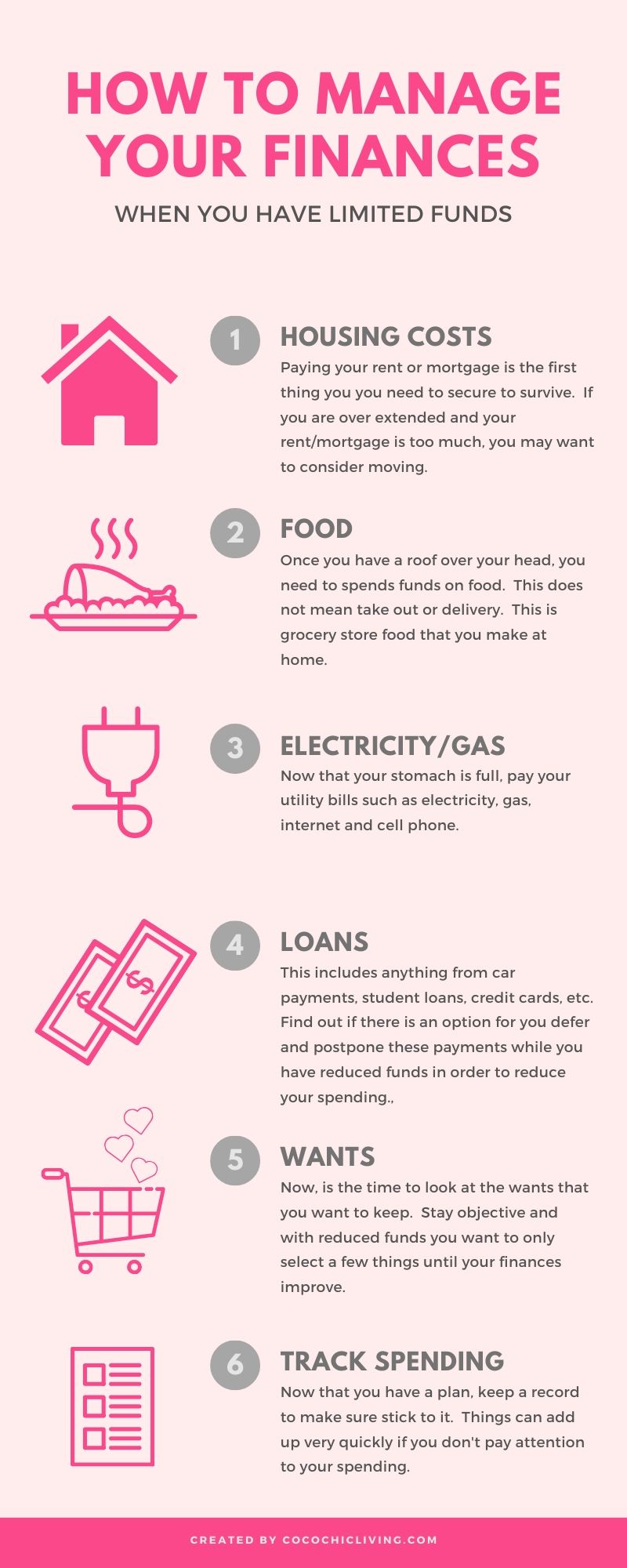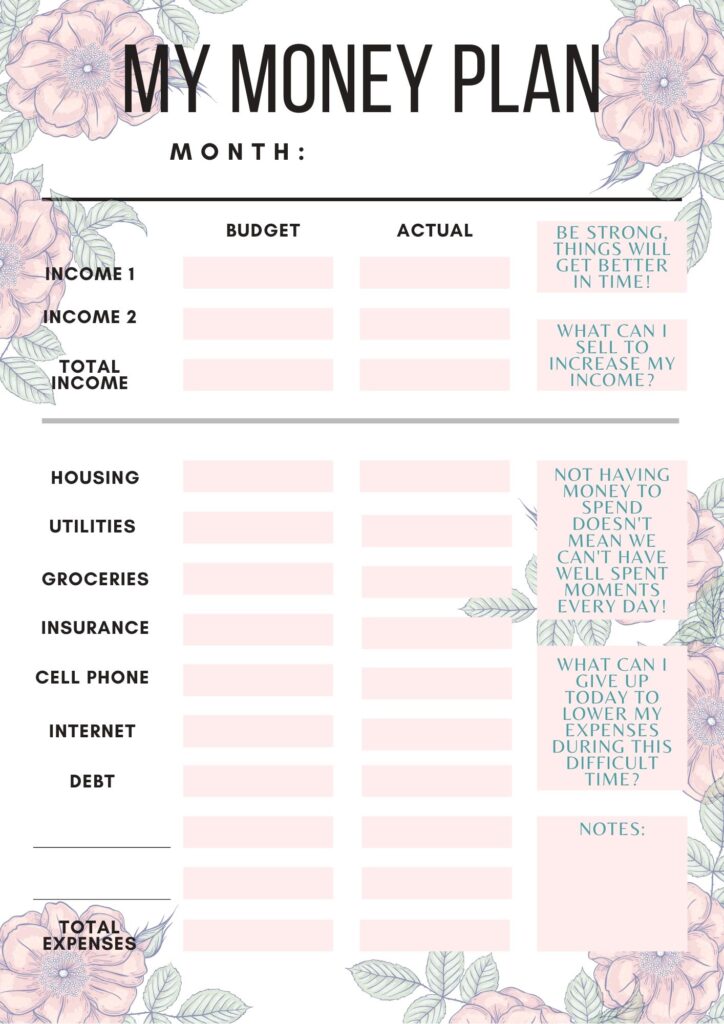
The world has been hit with a financial crisis and we all need to adjust how we manage money. So many people lost their jobs recently and don’t know how they are going to overcome this financial crisis.
You may have already been living pay check to pay check, trying to pay down debt or had the perfect budget. Regardless of your previous financial position, now is the perfect time to upgrade your financial knowledge and adjust how you manage money for your current circumstances.
In this post, I will cover the following:
- What NOT to do
- Scams to beware of
- How to create a Basic Minimum Budget
- In what order to pay your bills
Don’t Panic
When difficult times happen unexpectedly, we tend to over compensate. Our bodies go into fight or flight mode and all rational thought gets lost in the turmoil.
Now is the time to take a step back and take things slowly. Oftentimes, decisions made in haste are not to our advantage. It was made coming from a sense of stress, overwhelm and fear. So, before finalizing any decisions:
Promise yourself that you will wait 24 hours before fulfilling them.
Scams
Before I get into the nitty gritty of how to manage your money during a financial crisis, I want to be sure to point out that there are A LOT of scams right now. It disgusts me to have to even address this topic but it’s important that everyone be cautious. They know exactly how to prey on peoples fears.
- The tax department will not call you wanting payment in prepaid Visa cards or bitcoin!
- You will not receive a text message requesting your banking info to receive your government benefits!
- Never send money via email transfer to someone you have not met in person!
- Do not confirm your identity over the phone by giving them your Social Insurance Number! (or Social Security Number in the US)
Spammers are getting more and more savvy. They may already have bit and pieces of information that make them sound official. If in doubt, hang up the phone. You can follow up by calling your bank, credit card company directly to see if it is in fact a real issue.
Be smart and err on the side of caution. If it feels off, it probably is!
Income
First you need to assess is how much money you will have access to each month. This can be in the form of government benefits, investment income, emergency funds or even selling some stuff to get cash in your pocket. Depending on what type of assets you currently hold, this is how I would liquidate funds to use for monthly expenses.
- Government benefits: apply to get anything and everything you are eligible for through the government.
- Emergency funds: access these in order to supplement the above.
- Liquid assets: if you have resources that are easily sold such as investments that aren’t for retirement, go ahead and use these. Just be sure to talk to your advisor about any tax implications of doing so.
- What can you sell? Most of us have a house full of stuff that we don’t use or need anymore. Perhaps, you can take this down time to clear it out and earn a bit of money selling it on site like craigslist, facebook marketplace or kijiji.
- Debt or retirement funds: I address this question later in the post.

Emergency Funds
This type of situation is exactly why you want to build up an emergency fund while you are working and have income. You may have to forego a fancy dinner out or getting your nails done each month but it’s better than having the stress of having no money when life goes sideways.
Let me be clear, I am NOT telling you this now because I am trying to shame you. Many, many people are in the same boat. So, why then do I bring it up? Because once things get back to normal and you are working again, I want you to set aside some money each month into a separate account and build your emergency fund for the future.
Even if you can only afford to put $20 a month, I want you to do it. That’s only $10 each pay check if you get paid twice a month. If you can afford more, then of course, use that amount. Just choose a sum that you know without a doubt you can set aside each and every month. Remember, you can always start with $20 a month and increase it over time as you get used to it.
The best option to set this up is to have it automatically moved each pay period by your bank into a separate account. If that’s not an option, then you need to be diligent to move it yourself each time you get paid. Even if you just put cash into a jar each time you get paid. The important thing is that you are making a new habit of saving for emergency’s.
Debt Or Retirement Funds?
A question I often get is should I go into debt or take money out of my retirement savings. This is a tough question to answer because it’s dependant on what the future outlook is for your personal situation. Overall, there are a couple things to consider before making a decision.
If, you know for a fact, this is only a temporary situation and you can afford to pay it back sometime in the near future, then you’re okay to use debt as a temporary solution. First, use your line of credit before using your credit cards as it will have a much lower interest rate.
However, if you already have a lot of debt that you struggle to pay it down at the best of times, my recommendation would be to avoid going into any more debt at all costs. Just know that the funds you take out of a retirement account will be taxed and should only be used as a last resort
Now that you know how much you have access to each month, it’s time to decide how you want to allocate those funds.
Creditors
If you have any debt such as credit card, student loans, car payments etc. My first suggestion is to contact each one of them to see if there are any programs available for your situation. You are NOT alone and often times, it just takes a call to get a better interest rate or you can defer your payments for a couple of months. But, without calling, you will never know.
If you are unable to make the payment, try to pay something. It always looks better from a creditor standpoint that you are at least trying to make a portion of the payment rather than making no payment for months on end. Then when things are back to normal, you can attempt to pay the missed amounts or if that’s not possible at least get back to making those minimum payments.
Pause Saving
While funds are tight, put a pause on any and all savings plans. That includes everything from setting aside money for an emergency fund, holiday savings, investments, retirement savings and education plans etc. Yes, I agree that you should pay yourself first and your savings programs are there for that purpose. However, during a financial crisis, you want to decrease the amount of outgoing funds as much as possible.
First Things First
Before considering anything else, you must first cover your housing and food costs. That is what you absolutely must have to survive! You want to make sure that you have enough for these 2 things before you consider anything else.
Then comes your utilities such as electricity, gas, cell phone and internet (no that does NOT include TV). Following that, you want to pay your loans and minimum debt payments. And only after you have covered these major payments and still have funds left over, can you consider any wants.
Keep in mind that this is a guideline only. At the end of the day, you decide what is a priority for you and your family.
We live in a culture that has become overly dramatized. How many times have you heard someone say “OH MY GOD, I NEED THAT!” or “I WILL LITERALLY DIE IF I DON’T GET IT!”.
Yet, for many in the world, just the ability to keep a roof over their head and food on the table is the most they can ever hope for.
Needs vs. Wants
There is a BIG difference between NEEDS and WANTS. During a financial crisis, it’s imperative that you get a clear understanding of what you really NEED each and every month. Needs are generally what you require to survive. They are the essentials that you can not go any significant period of time without. Food, Shelter, Clean Water, Electricity are the basics of daily living and fall into this category.
Whereas, wants are the things that enhance your life and that you’d like to have but can survive without having. They are the things that you should be able to cut out of your life without any significant or long term disruption. You might miss ordering delivery, watching TV or buying new clothes, but you could do without them if you needed to.
During a financial crisis, it’s crucial to understand what really fits into each of these categories and to honestly and objectively evaluate your spending habits. I am not saying you can’t have any wants. Under normal circumstances, I would insist on it or you would feel deprived. However, during a crisis you need to be able to pare down your monthly spending to the bare minimum in order to get through the crisis with minimal damage to your finances.
Objectivity is the key to make sure you’re properly classifying needs and wants. While lots of the things we spend money on every day may feel like necessities, we tend to spend a significant chunk of our income on wants. During normal circumstances, as long as that’s a conscious decision you make, it’s perfectly fine.

Basic Minimum Budget
Now, I’m a single female living in one the most expensive cities in the world. My rent alone is $1550 a month because I choose to live in the heart of the city. However, to compensate, MY BASIC MINIMUM BUDGET is just under $2200 a month.
| Rent | $1550 | Utilities | $35 |
| Car Ins | $150 | Cell | $85 |
| Internet | $65 | Food | $300 |
| Amazon | $10 | Total: | $2195 |
This goes against most financial planning guidelines as my housing costs take up 71% of my basic minimum budget. However, it actually only accounts for about 40% of my normal income. Again, it’s still on the higher side but I assure you I watch any additional spending like a hawk! On average, I’d say I spend an additional $100-$150 a month for a meal out, a new piece of clothing, a cup of tea. And for me, that’s enough.
If I needed to, I could still cut out my Amazon Prime and decrease my Car Insurance since I’m not actually driving anywhere these days!
Do you know what your BASIC MINIMUM BUDGET is?
Spending Habits
Think of this time as an opportunity to learn more about your usual spending habits. There are probably a lot of things that you spent money on without a second thought. Yet, all those little amounts can add up quickly. Maybe it’s time to reflect on that spending to see if you really want to continue spending as much as you used to.
For example, $5 for coffee and $10 for lunch every work day adds up to over $300 a month!
Conclusion
During difficult times, you need to make the tough decision to cut out things that you are accustomed to having. Things such as cable TV, Netflix, clothes shopping, make up, subscription boxes, Amazon Prime, etc. Keep in mind that this is only temporary. Once you are back to a steady income, you can add back those WANTS to your list of expenses.
I hope this helps you decide where to spend your limited funds to get through this financial crisis.
Get Your Own Basic Minimum Budget Worksheet NOW!

Related Content You May Also Be Interested In:
~ How To Save Money On Everyday Things
~ How to easily save $1000 in taxes every year
~ A surefire way to save interest on credit card debt
~ 5 Tested Tips You Need To Know Shopping Online
~ #1 Strategy To Pay Off Your Debt Fast!
